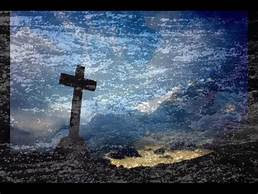Luke 23:33-43 (The Message)
33 When they got to the place called Skull Hill, they crucified him, along with the criminals, one on his right, the other on his left.
34-35 Jesus prayed, “Father, forgive them; they don’t know what they’re doing.”
Dividing up his clothes, they threw dice for them. The people stood there staring at Jesus, and the ringleaders made faces, taunting, “He saved others. Let’s see him save himself! The Messiah of God—ha! The Chosen—ha!”
36-37 The soldiers also came up and poked fun at him, making a game of it. They toasted him with sour wine: “So you’re King of the Jews! Save yourself!”
38 Printed over him was a sign: this is the king of the jews.
39 One of the criminals hanging alongside cursed him: “Some Messiah you are! Save yourself! Save us!”
40-41 But the other one made him shut up: “Have you no fear of God? You’re getting the same as him. We deserve this, but not him—he did nothing to deserve this.”
42 Then he said, “Jesus, remember me when you enter your kingdom.”
43 He said, “Don’t worry, I will. Today you will join me in paradise.”
What ever we say about Jesus and his Kingdom, however we try to understand the manifestation of power and glory which was his as the King who will reign wisely and do what is just and right; how ever much we are moved by the powerful words of the Hallelujah Chorus which shouts “King of Kings and Lord of Lords, forever!” We are reminded today that Jesus Kingdom is not of this world and is not like anything else in this world. It is not made up of that which makes up our kingdoms. it is as different as night is from day.
For it is not a matter of power politics; nor of deceptive promises. It is not a matter of domination and manipulation. Jesus Kingdom is made up of compassion, kindness, gentleness, forgiveness, joy, peace and is found in places of weakness and foolishness, where the power and wisdom of God is revealed in all its power and glory.
Robert MacAfee Brown relates the following life experience.
“The story is a true one. It takes place on the roof of one of the crematoria at Birkenau, the death camp of Auschwitz, on a gray, cheerless day in the summer of 1979.
A group of us are standing on ruins the Germans tried (unsuccessfully) to obliterate, to hide evidence that six million Jews had been shot and gassed and burned in such places, solely because they were Jews.
I reflect: if Golgotha revealed the sense of God-forsakenness of one Jew, Birkenau multiplies that anguish at least three and a half million times. For the rest of my life, this crematorium will represent the most powerful case against God; the spot where one could - with justice - denounce, deny, or (worst of all) ignore God, the God who was silent.
On what use are words as such a time? So many cried out to God at this spot and were not heard. Human silence today seems the only appropriate response to divine silence yesterday.
We remain silent. Our silence is deafening.
And then it comes - first from the lips of one man, Elie Wiesel (standing in the camp where thirty-fife years earlier his life and family and faith were destroyed), and then in a mounting chorus from others, mostly Jews, the great affirmation: ‘Shema Yisroel, Adonai Elohenu, Adonai echod, Hear, O Israel, the Lord our God, the Lord is One.’ “
Prayer thought for the week: “Lord, may your kingdom come this week, this day, this hour, in and through me your unworthy servant.” Amen










